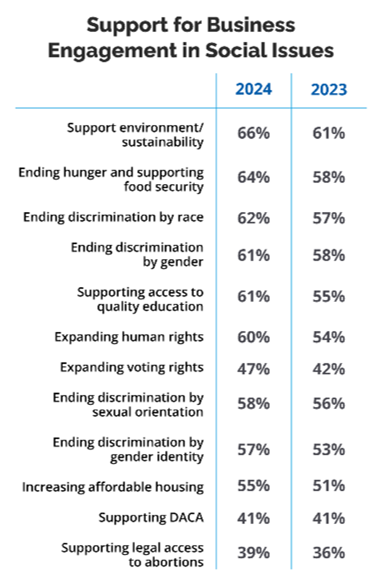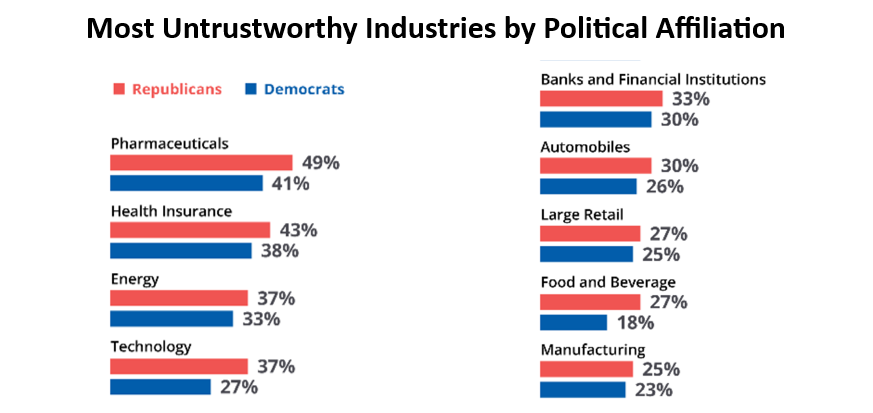
This blog is provided by the IPR Center for Diversity, Equity, and Inclusion.
Despite backlash from leaders who have called companies “woke” for supporting social causes, public expectations for corporate engagement in these issues has increased in the past year, according to a new Public Affairs Council poll.
Of the 12 social issues tested in the survey, 11 saw increases in public support for corporate engagement. Support for the remaining issue — creating pathways to citizenship through DACA — held steady with 41% approving of business involvement and 38% opposing it.

The 2024 Public Affairs Pulse Survey, conducted Sept. 1-3, 2024 by Morning Consult, provides an in-depth look at American public opinion on challenges and issues facing business, government, and society.
Social causes with the largest jumps in public support were efforts to end hunger, provide access to quality education, and support human rights. Each of these issues saw gains of six percentage points since 2023. Causes with gains of five points included actions to protect the environment, end racial discrimination and expand voting rights.
When responses are sorted by political affiliation, differences of opinion are huge.
Approval gaps between Democrats and Republicans range from 13 percentage points (supporting education and food security) to 27 percentage points (ensuring access to abortions).
Other social issues with large political divides include actions to end discrimination by gender identity (26 percentage points) and actions to support DACA (25 percentage points).
Are the Democrats Now the Pro-Business Party?
57% of Americans consider the Republican Party to be pro-business, while only 43% believe the Democratic Party is pro-business. These results are similar to the 2023 findings and support the notion that the GOP is still more likely to support corporations and their policy goals. However, 69% of Democrats now say their party is pro-business, and only 49% of Democrats say Republicans are pro-business.
When we examine overall favorability of business, Republicans are responding as expected. While 55% of GOP members have a generally favorable opinion of major companies, only 48% of Democrats agree.
The picture becomes hazier, however, when we look at Republican and Democratic attitudes about how well major companies are carrying out basic business functions. Republicans are less likely than Democrats to believe major companies are effectively providing useful products and services (54% vs. 61%), serving customers (51% vs. 54%), creating jobs (46% vs. 48%) and serving stockholders (46% vs. 48%).
Now let’s look at data on perceived untrustworthiness of corporations by industry and political affiliation. Given the pro-business reputation of the GOP, it’s surprising that Republicans are more distrustful of major companies in all nine sectors tested: pharmaceuticals, health insurance, energy, technology, banks and financial institutions, automobiles, large retail, food and beverage and manufacturing.

For example, while 37% of Republicans view tech companies as more untrustworthy than average, only 27% of Democrats agree. That amounts to a 10 percentage-point difference on the issue of distrust.
If you’re keeping score at home, GOP voters are more likely to criticize many aspects of business performance, from providing useful products and services to creating jobs. They are also more likely to label companies — in every major sector — as being more untrustworthy than average. And, finally, many of them strongly oppose corporate involvement in social issues even when those issues are popular and companies have been supporting them for decades. Why, then, do so many Americans believe the GOP is the “party of business”?
The answer lies in Republicans’ instinctive dislike and distrust of government regulation.
Parties Have Divergent Views about Regulation
Each year we ask Pulse Survey respondents to score each of the same nine industries for whether they are more in need of regulation than other industries. In 2024, the pharmaceutical industry is once again considered the sector most in need of regulation, followed by health insurance. Energy comes in third rather than fourth this year. The biggest change, however, involves the food and beverage industry, which was considered the sector least in need of more regulation last year (ninth out of nine industries), but this year it is in sixth place out of nine.
Even when many Americans believe a sector is underregulated, Republicans often are satisfied with the current regulatory level or may even consider that industry too burdened by regulations. For example, 33% of the public currently believe the energy sector is underregulated and only 20% think it is overregulated. GOP voters disagree, with 30% saying it is overregulated and only 26% considering it underregulated.
Democrats, meanwhile, take the opposite stance — they consistently believe a given sector is more in need of regulation than does the average American. In the case of energy, 43% of Democrats would like to see more regulation and only 12% think government is already regulating that sector too much.
And so, what we have are two political parties that view themselves as pro-business. The first doesn’t seem to trust major companies very much but has a strong bias against regulation. The second trusts corporations more and clearly likes their products, services and engagement in social issues, but has a strong bias in favor of regulation.
What this means is there is no longer a pro-business party that companies can generally count on to support their public policy goals. Depending on a host of factors including the saliency of the issue, partisan politics, media attention, and the political calendar, companies will have an increasingly difficult time sorting out their allies from their opponents.

Doug Pinkham is president of the Public Affairs Council, the leading global association for public affairs professionals. The Council, both nonpartisan and nonpolitical, has more than 750 member companies, associations and universities. You can reach him at dpinkham@pac.org.



